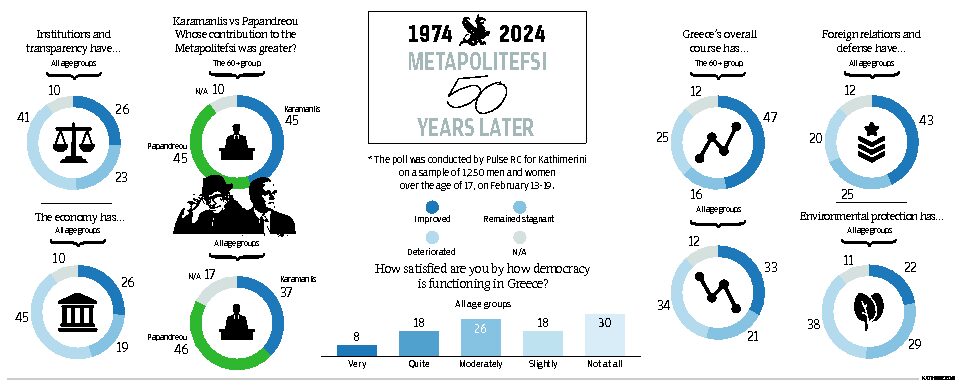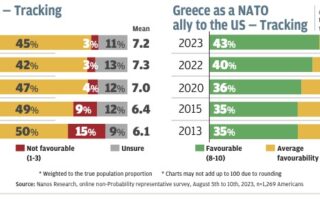Metapolitefsi divides generations
Poll on 50 years since Greece’s dictatorship fell shows gulf between age groups

The remarkable (if not yawning) chasm between the generation that experienced the entire cycle of Greece’s return to democracy after the fall of the 1967-74 military dictatorship and younger age groups born into the cycle of the so-called Metapolitefsi has been vividly illustrated by a poll commissioned by Kathimerini that was presented last week at a conference on the subject.
The poll’s objective to set out the beliefs and perceptions of Greeks aged 60 and above (meaning that they were at least 10 years old when the junta fell), but also of all age groups on the accomplishments, mistakes and oversights during this 50-year period, has yielded a series of fascinating finds.
Specifically, respondents with personal experience (and therefore a deeper understanding of) the entire cycle of Greece’s return to democracy have a more positive view of the Metapolitefsi and treat it with much more generosity than younger respondents.
Pulse’s CEO George Arapoglou, who presented the poll’s findings at the “50 Years of the Metapolitefsi” conference on Thursday, told Kathimerini that disaffection appears to be especially strong among Greeks aged 17-44. Explaining the phenomenon noted by the pollsters as being unsurprising, he said that these are men and women who have associated their adult lives with consecutive crises, and particularly with the financial meltdown of 2010-2019.
“This particular category does not have vivid memories of periods of strong economic expansion, nor does it have a multitude of reference points in the past that would allow it to make a more objective assessment or comparison,” Arapoglou said.
‘The less lenient attitude expressed by the younger generations tells us that the work of the Metapolitefsi is not done’
Having had first-hand experience of the fall of the dictatorship and the massive undertaking that followed for establishing strong democratic institutions and cultivating a democratic culture in society rather than hearing about it from those who were there, is the 60+ contingent that the poll has focused on the most objective from a scientific perspective, therefore?
“Of course. However, I would also add that the less lenient attitude expressed by the younger generations tells us that the work of the Metapolitefsi is not done; that there are serious loose ends that need to be addressed by the political establishment and by society,” Arapoglou said.
The chasm is most evident in the question gauging the functioning of democracy, the course of the economy and the overall course of the country. In contrast, there is more convergence in perceptions concerning environmental protection and foreign relations and defense.
How the generations assess the contribution of the Metapolitefsi’s two most iconic political leaders – Konstantinos Karamanlis and Andreas Papandreou – is also very interesting, with both receiving the support of 45% of respondents in the 60+ category, but socialist Papandreou gaining more among younger Greeks (46% against 37% for Karamanlis). Even though today’s 20- and 30-somethings obviously have no memory of the two leaders, it appears that family narratives about the “good old days of PASOK” have played some part.
The most interesting findings, however, came from a question asking the respondents to describe the 50 years of the Metapolitefsi in one word.
“We asked them to say the first word that sprang to mind, so their answers were much more spontaneous,” explained Arapoglou.
While initially there seemed to be convergence on “democracy” between the two groups, with 12% in both saying this word, more younger respondents used emotionally laden words like “disaster,” “terrible,” “mess” and “corruption.”
When it comes to ideas, in contrast, the center of the political spectrum came out the clear and enduring winner in both categories.





